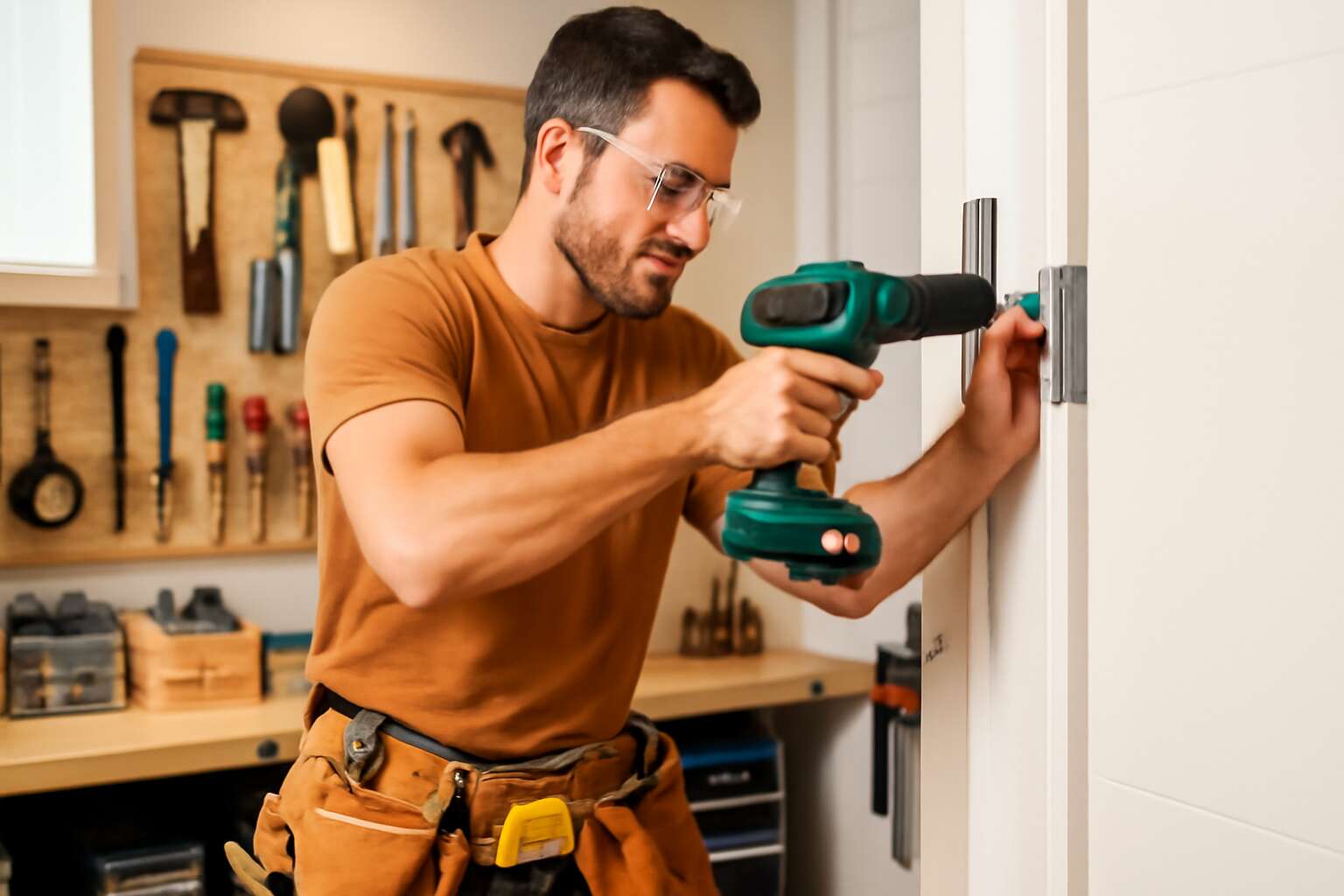Understanding the Responsibilities of a Handyman
General Maintenance Tasks – Overview of common repair and upkeep duties
In the bustling realm of home and commercial maintenance, understanding the scope of handyman roles is essential for those seeking reliable, versatile service. A skilled handyman isn’t just a jack-of-all-trades; they are the unsung heroes behind the seamless functioning of our daily environments. From fixing leaky faucets to patching up drywall, their responsibilities encompass a broad spectrum of general maintenance tasks.
Common repair and upkeep duties include handling plumbing issues, electrical repairs, carpentry, and painting. These tasks demand not only technical skill but also an eye for detail and a dash of ingenuity. When it comes to routine maintenance, a handyman might prioritize tasks such as:
- Inspecting and repairing roofing and gutters
- Maintaining doors, locks, and window frames
- Addressing minor electrical faults or appliance repairs
- Performing basic carpentry work for furniture or fixtures
In essence, the breadth of handyman roles ensures that every crevice of your property remains in tip-top shape, blending craftsmanship with a pragmatic approach. Their versatility is what truly sets them apart in the world of property upkeep, making them indispensable in South Africa’s dynamic housing and commercial sectors.
Fixing and Repairing – Details on plumbing, electrical, and carpentry repairs
Few professions blend the art of problem-solving with a dash of improvisation quite like handyman roles do. When a leaking tap transforms into a mini Niagara, or a flickering light threatens to turn your home into a haunted house, that’s when the true handyman steps into the spotlight. Their responsibilities go far beyond simple fixes; they are the architects of everyday resilience in South Africa’s bustling property landscape.
Take plumbing repairs, for example. A handyman’s expertise with plumbing isn’t just about tightening a bolt; it’s about diagnosing the root cause and implementing a lasting solution. From replacing worn-out washers to fixing stubborn blockages, they ensure your home’s waterworks run smoothly. Electrical repairs, another cornerstone of handyman roles, demand precision—think rewiring, troubleshooting circuit faults, or installing new switches, all handled with safety and finesse.
Carpentry work is also a vital component of their skill set. Whether it’s fixing a creaky door, creating custom shelves, or repairing furniture, their craftsmanship keeps your living space functional and stylish. In essence, the versatility of handyman roles means they’re the dependable go-to for a wide array of repair needs—delivering quality work with a pragmatic approach that’s as reliable as South Africa’s sunrise.
Installation Services – Installing appliances, fixtures, shelving, and more
In the realm of home transformation, few roles evoke such a blend of artistry and precision as that of the handyman. Their responsibilities extend beyond mere repair—they are the architects of seamless installation, turning visions into tangible reality. Understanding the scope of handyman roles in installation services reveals a world where practicality meets ingenuity. From mounting a sleek flat-screen TV to installing a new set of kitchen fixtures, their touch breathes new life into familiar spaces.
Installation tasks demand a keen eye for detail and a meticulous approach. Whether fitting custom shelving that transforms clutter into elegance or wiring a new lighting fixture that bathes a room in warmth, their expertise ensures every element is secure and functional. The versatility of handyman roles means they are often called upon to handle a diverse array of installation projects, each requiring a unique blend of skill and finesse.
For example, when installing appliances, a handyman carefully assesses the space, ensuring proper connections and safety compliance. The process often involves:
- Aligning and securing heavy appliances
- Connecting electrical components safely
- Ensuring water-tight seals for dishwashers or washing machines
Each task embodies their dedication to quality craftsmanship, transforming ordinary homes into extraordinary living spaces. In South Africa’s vibrant property landscape, handyman roles in installation services stand as a testament to versatility, reliability, and the art of making every detail count.
Custom Projects – Handling personalized or specialized handyman tasks
Every home has its unique story, and sometimes that story requires a special touch—a bespoke solution that standard repairs simply can’t address. This is where understanding the responsibilities of a handyman in handling custom projects becomes essential. Their role extends beyond routine maintenance, delving into tailored tasks that demand ingenuity and precision. Whether it’s creating a custom-built bookshelf or designing a bespoke storage solution, handyman roles encompass a broad spectrum of personalized craftsmanship.
Handling these specialized tasks requires a keen eye for detail and an ability to adapt swiftly to diverse challenges. The versatility of handyman roles means they are often called upon to bring creative visions to life, transforming ordinary spaces into reflections of individual personality and style. For example, designing a unique outdoor deck or installing a custom wine rack involves not just technical skill but also an understanding of aesthetics and functionality.
When executing custom projects, a handyman must balance practicality with artistry. Their responsibilities include assessing space, sourcing appropriate materials, and ensuring that every element aligns with the client’s expectations. This level of craftsmanship highlights the importance of their role in turning conceptual ideas into tangible realities, making their contribution invaluable in the realm of home improvement and personalization.
Key Skills and Qualifications of a Handyman
Technical Skills – Proficiency in carpentry, plumbing, electrical work, and painting
In the realm of handyman roles, mastery over a diverse set of technical skills transforms a mere fixer into a true artisan of repair. A proficient handyman in South Africa must possess a keen understanding of carpentry, plumbing, electrical work, and painting—each skill a vital thread woven into the fabric of everyday maintenance. These technical abilities are not simply learned but honed through experience, turning rough timber into elegant fixtures or tangled wiring into safe, reliable circuits.
Beyond raw talent, a handyman must also demonstrate an unwavering commitment to quality and safety standards. For instance, familiarity with local electrical codes ensures every installation is both compliant and enduring. To excel in handyman roles, one must adapt swiftly to the unique demands of each project, whether installing a new kitchen sink or repairing intricate electrical systems. Such versatility—coupled with technical prowess—defines the true essence of a skilled handyman.
Problem-Solving Abilities – Diagnosing issues and implementing effective solutions
In the intricate dance of handyman roles, problem-solving abilities serve as the heartbeat that sustains every project’s rhythm. A handyman’s capacity to diagnose issues swiftly and accurately often distinguishes the merely capable from the truly exceptional. It’s not just about fixing what’s broken; it’s about understanding the underlying causes and devising solutions that are both effective and enduring.
Mastery in this realm requires a keen eye for detail and an intuitive grasp of mechanical, electrical, and structural nuances. For instance, when faced with a leaky pipe or flickering electrical circuit, the handyman’s skill lies in unraveling the root problem rather than merely patching symptoms. This demands a blend of technical knowledge, experience, and creative thinking—qualities that elevate handyman roles into an art form.
- Assess the problem thoroughly, considering all contributing factors.
- Devise a tailored solution that addresses the root cause.
- Implement repairs efficiently while maintaining safety standards.
- Follow up to ensure long-term reliability and customer satisfaction.
Such comprehensive problem-solving not only restores functionality but also fosters trust and confidence, hallmarks of a truly proficient handyman in South Africa. It’s this relentless pursuit of excellence that transforms routine repairs into moments of craftsmanship, reinforcing the indispensable nature of problem-solving abilities within handyman roles.
Customer Service Skills – Communicating effectively with clients
Effective communication is the cornerstone of successful handyman roles. When working with clients, a handyman’s ability to listen attentively and convey ideas clearly can make all the difference. It’s not just about fixing things; it’s about building trust through genuine dialogue. Customers in South Africa often appreciate a handyman who explains repairs in simple, relatable terms, fostering confidence and reassurance.
Having strong customer service skills is essential for any handyman. This includes being punctual, respectful, and transparent about the scope of work. A skilled handyman also demonstrates patience, especially when clients have questions or concerns about their projects. These qualities help forge lasting relationships and turn one-time repairs into ongoing partnerships.
To excel in handyman roles, many professionals cultivate a set of interpersonal skills that complement technical expertise. For example, problem-solving abilities combined with excellent communication ensure clients feel heard and understood. Such harmony between skill sets transforms routine tasks into moments of genuine craftsmanship, elevating the reputation of the handyman and enriching the lives of those they serve.
Safety Knowledge – Understanding safety protocols and regulations
In the realm of handyman roles, safety knowledge isn’t just a box to tick; it’s the foundation that transforms skilled work into a trusted craft. A handyman must possess a keen awareness of safety protocols and regulations that govern every project, from electrical wiring to scaffold assembly. South Africa’s unique building codes and safety standards demand more than just familiarity—they require a commitment to diligent adherence, ensuring both worker and client remain secure amid the chaos of construction and repair.
Understanding the importance of safety is like holding a lantern in the dark — illuminating the path to responsible craftsmanship. It involves knowing how to handle tools properly, recognizing hazards before they become accidents, and following a set of best practices that safeguard everyone involved. Skilled handymen often undertake formal safety training, which covers essential areas such as
- hazard identification
- use of personal protective equipment (PPE)
- safe working at heights
ensuring every task is executed with precision and care. In the landscape of handyman roles, this unwavering focus on safety elevates the profession from mere repair work to a true art of safeguarding lives and property alike.
Types of Services Provided by Handymen
Home Repairs – Fixing leaks, repairing drywall, fixing locks
Every home, no matter how sturdy, whispers secrets of wear and tear—silent reminders that maintenance is an unending dance. Handyman roles extend beyond mere fixes; they embody a nuanced understanding of a home’s unspoken needs. From sealing the tiniest leak that threatens to escalate into chaos, to restoring drywall that has seen better days, handymen are the silent guardians of comfort and safety.
These professionals excel in a spectrum of services, often combining skills to deliver comprehensive solutions. For instance, they might fix a leaky faucet, repair damaged plaster, or replace worn-out locks—all within a single visit. Their expertise ensures that each task, no matter how small, contributes to the integrity of your space.
- Addressing plumbing issues with precision and care
- Restoring structural elements like drywall or cabinetry
- Upgrading security through lock repairs or replacements
In the realm of handyman roles, adaptability is key. Every project is a puzzle—requiring not just technical skill but an intuitive grasp of what the home needs beneath the surface. It’s this depth of understanding that transforms simple repairs into acts of quiet craftsmanship, fostering a sense of stability and trust for every homeowner in South Africa.
Renovations – Minor remodeling, updating fixtures
When it comes to maintaining a home, versatility is essential. Handyman roles encompass a broad spectrum of services that go beyond basic repairs, often transforming spaces with minor renovations or updates. These professionals are adept at handling various tasks that require a keen eye for detail and an intuitive sense of what a space needs. Whether it’s upgrading outdated fixtures or executing small-scale remodeling, they bring a wealth of skills to every project.
In particular, minor remodeling projects can breathe new life into a home, enhancing both form and function. Tasks such as updating kitchen hardware, replacing tiles, or refurbishing bathroom vanities are common examples of handyman roles in action. For these jobs, experience in carpentry and plumbing ensures that each update seamlessly integrates with existing structures, elevating the overall aesthetic and utility of the space.
For homeowners seeking a fresh look or improved functionality, skilled handymen excel at delivering tailored solutions. They often employ a combination of technical expertise and creative problem-solving to ensure that even the smallest updates make a significant impact. In South Africa, where homes often reflect a vibrant mix of tradition and modernity, these roles are vital in maintaining the charm and safety of every residence.
Outdoor Maintenance – Gutter cleaning, fence repairs, landscaping support
Outside the sanctuary of your home, a handyman’s touch can transform and protect your living space in ways both subtle and spectacular. Gutter cleaning, for instance, is more than just clearing debris; it’s a vital task that preserves the integrity of your roof and prevents costly water damage. Fence repairs, often overlooked, serve as the first line of defense against intruders and the elements, ensuring your property remains secure and aesthetically pleasing.
Landscaping support, another essential facet of handyman roles, involves tasks such as leveling soil, planting, or installing garden features—each action weaving a touch of nature’s artistry into your outdoor realm. These services are often delivered with a blend of technical skill and an intuitive understanding of design, creating harmony between functionality and beauty.
Whether it’s a simple repair or an elaborate outdoor upgrade, skilled handymen bring a wealth of expertise. Their versatility ensures that every corner of your home’s exterior receives the attention it deserves, helping your property stand proud amidst South Africa’s vibrant climate and diverse landscape.
Commercial Maintenance – Office repairs, retail space upkeep
In the bustling heart of South Africa’s vibrant commercial landscape, the role of a handyman extends far beyond simple repairs. These versatile artisans are the unsung heroes behind the seamless operation of office spaces and retail environments. Their expertise in commercial maintenance ensures that every corner of a business premises exudes professionalism and safety, reinforcing a lasting impression on clients and staff alike.
From fixing faulty electrical outlets to repairing leaking pipes, handyman roles encompass a wide spectrum of essential services. They often handle tasks such as installing new fixtures, maintaining lighting systems, or performing routine upkeep that keeps the workspace functioning smoothly. For larger projects, their problem-solving skills shine brightest, diagnosing issues quickly and implementing effective solutions to minimize downtime.
Moreover, a skilled handyman’s ability to manage diverse tasks—whether it’s patching drywall, repainting walls, or upgrading signage—makes them indispensable for maintaining the aesthetic and operational integrity of commercial spaces. Their technical proficiency, combined with a keen eye for detail, ensures that every project is completed with precision, transforming ordinary spaces into extraordinary environments that reflect professionalism and care.
How to Become a Skilled Handyman
Training and Certification – Relevant courses and licensing requirements
Becoming a skilled handyman requires more than just a toolbox and good intentions; it demands a deliberate pursuit of knowledge and formal recognition. In South Africa, the path to mastering handyman roles often begins with relevant courses that cover foundational skills such as carpentry, plumbing, and electrical work. These courses not only enhance technical proficiency but also instill a sense of safety and professionalism vital for success.
To elevate your handyman roles, obtaining the necessary licensing and certifications is essential. Many local trade associations and technical colleges offer accredited programs tailored to the unique demands of the South African market. These certifications serve as a testament to your expertise, reassuring clients of your reliability and skill.
For those eager to specialize, consider pursuing advanced training in areas like home renovations or outdoor maintenance. Such comprehensive education ensures you can handle diverse projects confidently, strengthening your reputation as a dependable handyman. Ultimately, investing in proper training and certification transforms basic handyman roles into a respected craft—one rooted in mastery and integrity.
Gaining Experience – On-the-job training, apprenticeships
Gaining hands-on experience is the crucible where true handyman roles are forged. Nothing replaces the raw, unfiltered lessons learned on the job—each project a chapter in the story of mastery. Apprenticeships and on-the-job training serve as the backbone of this journey, allowing aspiring handymen to immerse themselves in real-world scenarios. These immersive experiences cultivate not only technical skills but also an intuitive understanding of client needs and safety protocols.
Often, building competence involves shadowing seasoned professionals, observing their problem-solving approaches, and gradually taking on more complex tasks. By engaging directly with diverse projects, from fixing leaks to installing fixtures, a handyman hones the adaptability crucial for success. The more varied the experience, the deeper the understanding of handyman roles becomes, transforming industry novices into dependable artisans. This experiential path is essential—only through practical immersion can one truly embody the essence of a skilled handyman.
Building a Portfolio – Showcasing previous work to attract clients
Building a compelling portfolio is the cornerstone of establishing oneself as a trusted handyman in South Africa. It’s more than just showcasing a collection of fixes; it’s about telling the story of your craftsmanship and versatility. Clients want to see evidence of your skills in action—photos of completed projects, detailed descriptions of custom projects, and testimonials from satisfied customers.
Creating an impressive portfolio not only highlights your handyman roles but also demonstrates your adaptability across various tasks. As you gather work samples, remember that each project—be it fixing leaks or installing fixtures—adds a chapter to your professional narrative. Showcasing your proficiency in areas like carpentry, plumbing, electrical work, and painting can set you apart in this competitive industry.
- Start by documenting your best work with high-quality photos.
- Include detailed descriptions that highlight your problem-solving abilities and technical skills.
- Gather client feedback and reviews to boost credibility.
- Showcase diverse projects, emphasizing your capacity to handle both routine maintenance and complex renovations.
Ultimately, a well-curated portfolio acts as a visual resume, attracting new clients and opening doors to more handyman roles. Remember, in this craft, reputation is everything—let your work speak volumes!
Tools and Equipment – Essential tools every handyman needs
Becoming a skilled handyman in South Africa isn’t just about knowing your way around a hammer; it’s about arming yourself with the right tools and equipment for every job. Think of tools as your trusty sidekicks—without them, your handyman roles are limited to wishful thinking. Whether you’re tackling plumbing, carpentry, or electrical tasks, having a versatile toolkit can make all the difference between a job well done and a trip back to the drawing board.
To excel in this craft, you’ll need a mix of essential tools that cover a broad spectrum of handyman roles. Start with the basics: a reliable cordless drill, a set of screwdrivers, pliers, a tape measure, and a level. These are your bread-and-butter tools. For more specialized tasks, consider adding a saw, a multimeter for electrical diagnostics, and a paint sprayer for finishing touches. Remember, the right equipment not only boosts efficiency but also ensures safety on site.
- High-quality power tools to speed up repairs
- Hand tools like hammers, chisels, and screwdrivers for precision
- Safety gear—gloves, goggles, and masks—because safety in handyman roles is non-negotiable
Investing in durable, reliable tools might seem like a hefty upfront cost, but it pays off in the long run. A well-stocked toolbox transforms a jack-of-all-trades into a master of many—ready to handle everything from fixing leaks to installing new fixtures with confidence. Remember, in the world of handyman roles, your tools aren’t just equipment—they’re your passport to professional success and satisfied clients.
Benefits of Hiring a Professional Handyman
Time and Cost Savings – Efficient work that saves clients time and money
In a world where time feels like slipping sand, hiring a professional handyman emerges as a beacon of practicality and peace of mind. Their role isn’t merely about fixing things; it’s about weaving efficiency into the fabric of your daily life. By entrusting tasks to a skilled handyman, clients unlock a treasure trove of time and cost savings. These artisans of repair work swiftly and accurately, ensuring that projects—big or small—are completed without the costly delays that often accompany DIY attempts or untrained labor.
The secret lies in their mastery of handyman roles—an intricate dance of technical skill and problem-solving prowess. They eliminate guesswork, diagnose issues with precision, and execute repairs that stand the test of time. The result? Fewer callbacks, less wastage, and a smoother flow to your home or business upkeep. Embracing the expertise of a handyman transforms chaos into harmony, making every rand and minute count.
Quality and Reliability – Workmanship standards and guarantees
When it comes to home repairs, settling for a jack-of-all-trades who’s master of none can turn into a costly gamble. That’s where the real value of hiring a professional handyman shines—they bring unwavering quality and rock-solid reliability to every project. Their handyman roles encompass more than just fixing a leaky tap; they uphold meticulous workmanship standards, often backed by guarantees that ensure your peace of mind.
Unlike untrained amateurs, seasoned handymen follow strict safety protocols and use top-tier tools and equipment, ensuring each task is completed to a high standard. Whether it’s a simple drywall patch or a complex electrical upgrade, their technical skills and problem-solving prowess eliminate guesswork, delivering results that stand the test of time. For clients, this means fewer callbacks, less hassle, and a guarantee that your investment will endure. After all, the cornerstone of good handyman roles is unwavering quality—because your home deserves nothing less.
Versatility – Ability to handle a wide range of tasks
In a world where time is precious and quality matters, hiring a professional handyman offers unparalleled versatility. Unlike specialists who focus on one area, a skilled handyman can tackle a broad spectrum of tasks within your home or business. From fixing a leaking pipe to installing new fixtures, their handyman roles encompass everything needed to keep your property in top shape.
What truly sets a professional apart is their ability to adapt and handle diverse projects seamlessly. Whether it’s minor repairs or larger renovation projects, their technical skills and resourcefulness ensure each task is completed efficiently and to a high standard. For clients, this means less coordination with multiple contractors and more peace of mind. Their versatility also extends to outdoor maintenance, commercial upkeep, and custom projects—making them an invaluable asset in maintaining your property’s value and safety.
Safety Assurance – Ensuring work complies with safety standards
When it comes to maintaining the safety and integrity of your property, hiring a professional handyman is an investment that pays dividends. Their comprehensive knowledge of safety standards ensures that every repair or installation is carried out in compliance with local regulations and best practices. This meticulous attention to safety reduces the risk of accidents, damage, or future costly repairs, giving you peace of mind.
What truly sets a skilled handyman apart in their roles is their unwavering commitment to safety assurance. They meticulously assess each project’s specific requirements, identifying potential hazards before they become issues. Whether working on electrical wiring, plumbing, or structural repairs, their adherence to safety protocols guarantees that work is performed responsibly and reliably. This dedication not only protects the property but also safeguards everyone involved, making their handyman roles essential for a secure and well-maintained environment.
Tips for Choosing the Right Handyman
Checking Credentials and Experience – Verifying licenses and references
Choosing the right handyman involves more than just a quick glance at their price tag. Verifying credentials and experience is essential. A seasoned handyman with the right licenses and references can make all the difference in ensuring quality work. Don’t hesitate to ask for proof of qualifications—this builds trust and confirms they meet industry standards for handyman roles.
In South Africa, reputable handymen often carry certifications that demonstrate their proficiency in specific areas. Checking references from previous clients provides insight into their reliability and workmanship. A dependable handyman will willingly share a portfolio of past projects, showcasing their versatility across various handyman roles.
Remember, a qualified professional prioritizes safety and adheres to regulations. When selecting a handyman, focus on their track record and certifications to guarantee your project’s success. This diligence ensures you hire someone capable of handling diverse tasks with precision, saving you time, money, and future headaches.
Reading Reviews and Testimonials – Assessing reputation through feedback
When seeking a reliable handyman, reading reviews and testimonials is a crucial step in assessing their reputation. In South Africa, where the quality of handyman roles can vary widely, feedback from previous clients offers invaluable insights into their reliability and skill level. Genuine testimonials reveal how well a handyman handles diverse tasks, from home repairs to outdoor maintenance, and whether they uphold safety standards.
Pay close attention to recurring themes in reviews—timeliness, professionalism, and quality of work. A handyman with consistently positive feedback often demonstrates a dedication to excellence that’s hard to match. To streamline your search, consider asking prospective handymen for a selection of references or a portfolio of past projects. This not only builds trust but also provides tangible proof of their versatility across various handyman roles.
Ultimately, a stellar reputation is built on more than just skills; it’s about fostering confidence through transparent feedback. Trusting reviews and testimonials allows you to select a professional who will approach your project with the same care and precision that you would—ensuring your investment in quality craftsmanship endures long after the work is done.
Getting Multiple Quotes – Comparing pricing and service details
Choosing the right handyman in South Africa can feel akin to finding a needle in a haystack—if the haystack were on fire. That’s why getting multiple quotes isn’t just good practice; it’s essential. Comparing pricing and service details helps you uncover the hidden gems and avoid the flaky amateurs masquerading as skilled craftsmen. Don’t settle for the first quote that lands in your inbox; instead, seek out detailed estimates that include scope of work, materials, and timelines. This way, you’re not only protecting your wallet but also ensuring you get the quality handyman roles you deserve.
A savvy homeowner will often request a few references or a portfolio of past projects. This not only builds trust but also provides insight into their versatility across various tasks—whether it’s fixing a leaky tap or installing a new kitchen fixture. Remember, the cheapest quote isn’t always the best; sometimes, it’s the one that offers the most comprehensive service at a fair price. After all, when it comes to handyman roles, value and reliability often outweigh mere cost.
Clear Communication – Defining scope of work and expectations
Clear communication is the cornerstone of successful handyman roles. When engaging a handyman in South Africa, defining the scope of work and setting realistic expectations can turn a daunting task into a smooth collaboration. It’s not just about getting the job done; it’s about ensuring both parties are on the same page from the outset. An open dialogue helps prevent misunderstandings and keeps the project flowing seamlessly.
To foster effective communication, consider outlining the specific tasks you need and asking your handyman to do the same. This mutual understanding creates a foundation of trust and clarity. Additionally, discussing timelines, materials, and budget constraints upfront ensures there are no surprises along the way. Remember, a handyman who communicates well is often the one who delivers quality work that meets your expectations.
In the realm of handyman roles, the ability to articulate needs and listen carefully is invaluable. It transforms a simple repair or installation into a collaborative effort that results in a polished finish. Whether it’s fixing a leaking pipe or installing new fixtures, clear communication guarantees that every detail is addressed, making your home improvement journey both enjoyable and efficient.





0 Comments